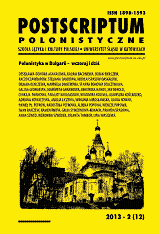Degradacja prometeizmu na podstawie literatury antycznogreckiej i polskiej
The Degradation of Prometheism on Material from Ancient Greek and Polish Literature
Author(s): Panajot KaragiozowSubject(s): Language and Literature Studies
Published by: Wydawnictwo Uniwersytetu Śląskiego
Keywords: Prometheism, tcheomachy, Jan Kochanowski, Adam Mickiewicz, Jan Kasprowicz, Sławomir Mrożek
Summary/Abstract: The myth of Prometheus belongs to the oldest and most frequently interpreted ancient myths. Over the centuries, Prometheism has deteriorated instead of evolving, and such a claim can be supported by comparing Aeschylus’ archetype with the theomachists in the masterpieces of Polish authors Jan Kochanowski, Adam Mickiewicz, Jan Kasprowicz and Sławomir Mrożek. The works reviewed in this article suggest that the types of theomachy reflects the respective dominant ideology and represents the actual position of every participant in the triad: the mass – the theomachist – the deity. Prometheus, as an equal to Zeus, sacrifices himself for the inferior human “ephemerals”; in his "Laments", Kochanowski creates his own anthropocentrical pantheon and demands from the resident deities to bring his beloved little daughter back to life or at least console his paternal grief; Konrad ("Forefather’s Eve"), in order to liberate his ethnic motherland, requests from God to give him the power to rule the world by feelings; the lyric hero of Jan Kasprowicz ("Holy God, Holy and Mighty") insists that God salvages mankind from disasters and starvation or becomes human again and come down to Earth and suffers with the ordinary people; whereas the Communist Bartodziej ("Portrait"), willing to fight the whole world in the name of his party leader, sacrifices the ones closest to him on the altar of Stalin, and ultimately destroys himself.
Journal: Postscriptum Polonistyczne
- Issue Year: 12/2013
- Issue No: 2
- Page Range: 113-135
- Page Count: 23
- Language: Polish

